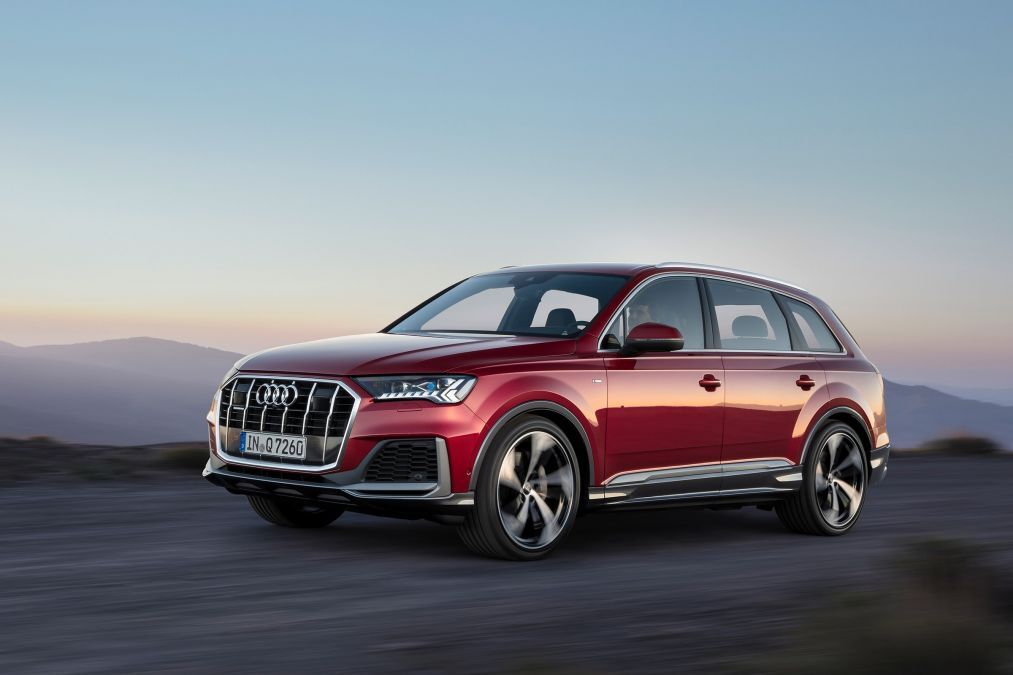2019 Audi Q7 facelift gets new interiors and 48V mild-hybrid system
The 2019 Audi Q7 facelift has been updated with a fresh interior and more rugged styling. It shares quite a lot with the Q8 in terms of interior and exterior styling. Audi says there will also be a plug-in hybrid variant soon after its launch.
 The 2019 Audi Q7 facelift has been updated with a fresh interior and more rugged styling. It shares quite a lot with the Q8 in terms of interior and exterior styling. Audi says there will also be a plug-in hybrid variant soon after its launch.
The 2019 Audi Q7 facelift has been updated with a fresh interior and more rugged styling. It shares quite a lot with the Q8 in terms of interior and exterior styling. Audi says there will also be a plug-in hybrid variant soon after its launch.Audi’s three-row Q7 SUV has been updated for 2019, gaining a fresh interior, more rugged styling and a wider adoption of mild-hybrid tech across the range. Audi is hoping these updates will keep the Q7 competitive against newer rivals in the latter half of its life cycle.
Where the Q7 was once an SUV of gargantuan proportions, new seven-seater rivals like the Mercedes GLS and BMW X7 have now overtaken the Audi in terms of proportions and price. Instead the Q7 will continue to rival the slightly smaller GLE and X5 internationally, both of which are now available with optional third rows.
Fresh new interiors for the 2019 Audi Q7 facelift
Read more about Audi here
The biggest upgrade is the all-new interior, an unusually substantial modification for this type of mid-cycle refresh. Rather than the horizontal aesthetic that featured before, the new Q7 now shares its dash, console and doors with the Q8. The new architecture is defined by Audi’s dual MMI touchscreens and a liberal use of gloss black trim to hide the junctions where the digital displays begin and end. The effect is definitely futuristic, and although the previous layout was still very much up-to-date, the new interior does add a welcome dose of glamour to the Q7.
Less dramatic exterior changes
Outside the changes are less drastic, but the effects definitely felt. New lighting units front and rear mimic other Audi models like the Q8 and new A4. Audi’s designers have been keen to point out the added emphasis on the utility bit of the Q7’s SUV tag. There’s now an extended use of contrasting colours and the addition of larger wheels. This makes it look more rugged and capable than the previous model.
Audi SQ8 TDI revealed – Top S variant with 429bhp V8 diesel
Under the hood of the Audi Q7
Under the skin Audi has incorporated its mild-hybrid system across a wider range. All Q7 models will now be fitted with a 48V electrical system borrowed from the SQ7. As in the performance flagship, the 48V system powers an optional active roll stabilisation system and assists the internal combustion powertrains with a small electric motor and battery pack. Rear-wheel steering, adaptive sports air suspension and new matrix LED headlights with a laser high beam system also occupy the options list, bringing the Q7 right up to date against rivals in terms of incorporated tech.
Like scenic locations and powerful cars? Follow us on Instagram, Facebook, and Twitter
Powering the current Q7
The current powertrain options available on the existing Q7 in India are the 45TDI and 45TFSI. The 45TDI is powered by a 2967cc V6 turbo diesel engine that churns 245bhp and 600Nm of torque. It has a top speed of 234kmph and sprints to 100kmph in just 7.1 seconds. The 45TFSI on the other hand gets an in-line 4-cylinder 2.0-litre turbo petrol engine. It puts out 248bhp and 370Nm of torque. It spurs the SUV to a ton in just 6.9 seconds.
New plug-in hybrid 55TFSIe
A few months after launch a new plug-in hybrid 55TFSIe will also be available internationally. It pairs a four-cylinder petrol engine with a much larger electric motor and lithium ion battery pack. However, there’s no word yet on this engine to be made available in India. What we also won’t get is the updated SQ7. It retains the 429bhp V8 TDI powertrain that’s identical to both the previous models and the new SQ8.
Audi will unveil the new Q7 at the upcoming Frankfurt Motor Show after which global sales will begin. India launch can be expected sometime in 2020.


